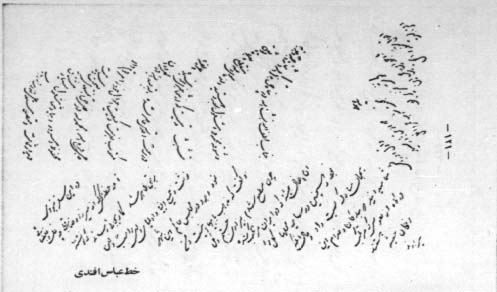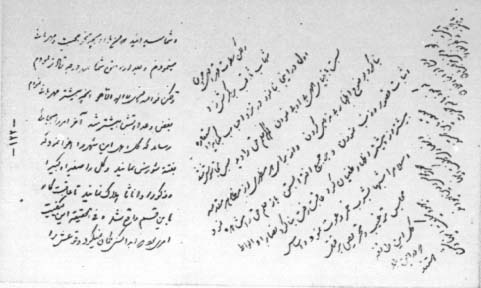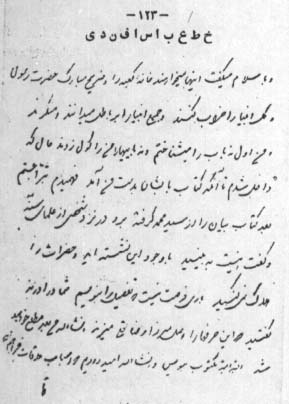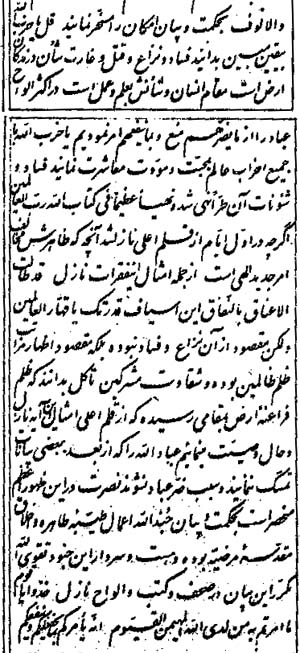Baha'i Assassinations
5. Baha And Abbas Effendi Condone Assassination of the Bayanis In Acre
Following an autograph letter of Sir Abbas Effendi who signed himself A&A during the lifetime of Baha (The Dawn Breakers, Nabil's Narrative, glossary, P. 674) addressed to a fellow Bahai named Lutfullah in Iran, in which Sir Abbas Effendi condons and justifies the murder of Mirza Riza Quli of Tafrish on the grounds that he condemned anti Bahai propaganda, ate pork and drank wine, the letter speaks for itself.
هوالله
جناب لطف الله انشاء الله در پناه حق بذکرالله و ثنائه و حبه و جله و شوقه محمود و مشغول بوده و هستید و از ماسوای الله منقطع و بعزة یوثقی متشبث مدتیست که در شما خبری نرسیده عریضه و رحمت اقدس حاضر شده البته صد البته در کل ادوان مکتوب بفرست و کیفیت احوال خود را مرقوم دار. حاجی فرج الله الحمد الله در ظل حق بمنتهای صحت و سلامت محفوظ و مسرور و بیاد شما مشغول بسیار مشتاق دیدار شماست و متصلا مستدعی ؟؟
در این سفر نبودی تا ملاحظه کنی که میرزا رضای قلی چه غل و بغضائی بر حق ظاهر شد و جمیع انبیا و اولیای الهی را سب و لعن نمود و برد در مجلس حاکم این شهر و گفت مذهب بابیها اینست و من چون مطلع شدم بیزاری جستم و کل آن اعمال خبیثه که در ایران مرتکب شده بود و همچنین در سایر محلها کل را به جمال مبارک نسبت داد و حال آنکه شمامیدانید که بندگان و خدام این درگاه از نفوسی که مرتکب اعمال خبیثه هستند بیزارند.
و اول ؟؟؟ باو رسید بجهت شرب خمر و اکل گوشت خنزیربود با وجود ؟ این افعال شنیعه را ؟؟ افترا بست
و شما میدانید که من با او به چه نحو محبت و مهربانی مینمودم و بعد از رفتن شما صد درچه تمامتر نمودم ولکن فوالله الذی لا اله الا هو انچه بیشتر مهربانی نمودم بغض و عداوتش بیشتر شد آخر امر را به چائی رساند که کل اهل این شهر را اغوا نمود که بغتته شورش نمایند و کل را صغیرا و کبیرا و ذکورا و اناثا هلاک نمایند تا عاقبت کار به این قسم واقع شد وفی الحقیقه این میگفت امری بود که ابدا کسی گمان نمیکرد و قوتش را ولکن سطوت قهر الهی چون شهاب ثاقب بر کمرش زد. اول در اینجا بنا نمود در نزد احباب به کنایه و استعاره نسبت بانبیای الهی بی ادبی نمودن و از برای هر مظهری از مظاهر مقدسه اثبات قصور و ذنب نمودن و بر جمیع افترا بستن باز علم حق را مشاهده نمود و بیشتر از پیشتر اظهار طغیان کرد عاقبت رفت بناکرد نصارا و الواط اسلام را شبها به شرب خمر دعوت نمود و اساس مجلس ترغیب و تحریض بر قتل کل این طائفه در این ؟ هستند.
بیهوده میگفت اینها دشمن حضرت موسی و دین یهودند و به نصاری میگفت اینها معتقد به این هسنتد که نعوذ بالله حضرت روح از ابناء فلان بوده و مبنی مذهبشان اینست که کل ؟ را باید کشت


خ ط ع ب ا س ا ف ن د ی
و با سلام میگفت اینها میخواهند خانه کعبه را و ضریح مبارک حضرت رسول و کل انبیا را خراب کنند و جمیع انبیا را باطل میدانند و منکرند و من اول نه باب را میشناختم و نه بابیها را من را گول زدند حال که داخل شدم تا آنکه کتاب بیان بدست من آمد تبرا جستم بعد کتاب بیان را از سید محمد گرفته برد در نزد شخصی از علمای سنه و گفت اینست به بینید با وجود این نشسته اید و حضرات را هلاک نمیکنید باری فرصت نیست که تفصیل بنویسم شما در ادرنه گفتید که این حرفها را میرزا قلی میزند انشاء الله من بعد مطلع خواهید شد البته البته مکتوب بنویس و انشاء الله امیدواریم که اسباب ملاقات فراهم شود

Sir Abbas Effendi 's autograph letter in which he condones the Acre assassinations is reproduced in the Kitab-i Subhi by Mirza Subhi Fazlullah Muhalati, one time Persian Scribe of the Abbas Effendi (pp. 184-186) as well as in the Kashf-al-Ghita (Vol. II 3rd in Persian, PP. 121-123) by Mirza Abd-al-Hussayn Ayati surnamed Awara former prominent Bahai proselytiser.
Assassinations By Baha's Hezbullah (Party of God)
Baha takes up a similar attitude to condone as a whole the assassinations committed by his followers on the strength of the earlier utterances of the "Supreme Pen", the obvious sense of which Baha admits conflicts with his new divine cause.
It was on the strength of the passages or the verse and the like thereof (see previous section) “revealed from the Supreme Pen in the early days” and quoted in the tablet that most of the BÂBis, including the two brothers of the Point’s second-wife, who withstood Baha’s pretensions, were sought out and slain wherever they chanced to be by members of the (Hezb’u’llah) “sect of god”.
Baha's revelation in which he calls a halt to such acts of violence and calls upon the "servants of God" to disregard such utterances, and to exercise self-restraint, henceforth appears in his Ishraqat, Tarazat, Tajaliat, tablets of Baha'u'llah. PP.14-15.
The text sums as follows :
قل یا حزب الله بیقین مبین بدانید فساد و نزاع و قتل و غارت در شأن درندگان ارض است و انسان شأنش بعلم و عمل است در اکثر الواح عباد را از مایضرهم منع و بماینفعهم امر نمودیم. یا حزب الله با جمیع احزاب عالم بمحبت و مودت معاشدت نمائید فساد و شئونات آن طرّاُ نهی شده و ؟ عظیماُ فی کتاب الله رّب العالمین اگر چه در اوّل ایّام از قلم اعلی نازل شد آنچه ظاهرش مخالف امر جدید الهی است از جمله امثال این فقرات قد ؟ الا ؟ بالنفاقه این اسیاق قدرتک یا قطر العالمین ولکن مقصود از آن نزاع و فساد نبوده بلکه مقصود اظهار مراتب ظلم ظالمین و شقاوت مشرکین تا کل بدانند ظلم فراعنه ارض بمقامی رسیده که از قلم اعلی امثال این آیه نازل و حال وصیت مینمائیم عبادالله را که از بعد ببعض بیانات تمسک ننمائید و سبب ضّر عباد نشوند نصرت در این ظهور اعظم منحصر است بحکمت و بیان جندالله طاهره و اخلاق مقدسه مرضیه بوده و هست.

It was on the strangest of this "utterances" and the likes of it that the "servants of god" sought out and obeyed prominent BÁBis, who understood Baha's pretensions, wherever they chanced to be, amongst them being Mulla Rajab Ali Ghahir, and his brother Aqa Ali Muhammad of Isfahan, brother in law of Sayyid Ali Muhammad, the BÁB, the point who was married to their sister Fatima.
The strange part of is Baha according to him was "Sayyid Ali Muhammad returned again." Prof. Browne's Art., xii, J.R.A.S. October 1889, p.952.
The strange part of it is these assassinations are entirely flashed out in Abbas Effendi's Traveller's Narrative.
The strange part of it is that Mirza Muhammad Jawad of Qazwin in his historical epitome dealt with only one particular case of murder at Acre, in which he was an accessory before the facts.- Materials for the study of the BÁBi Religion by Prof. Browne, pp. 52-55.
Baha's letters of the Baghdad period in categorical denial of charges of apostasy and deflection from Sayyid Ali Muhammad and Subh-i Azal preferred against him by prominent BÁBis, and in the reaffirmation of his allegiance and fealty to Sayyid Ali Muhammad and Subh-i Azal; Baha's will and testament of the Baghdad period in the same sense; allegation of fratricide at Edirne; Baha's information against Subh-i Azal lodged with the Ottoman authorities at Edirne, falsely accusing him of conspired to revolt against the established authority; Baha's Epistle to the kings and the ultimate fate of Sayyid Ali Muhammad's writings will be noticed in due course in their historical background on the documentary evidence of none other person than Baha himself.
Mirza Hussayn Ali's self-assumed and unauthorised title of Baha or Baha'u'llah will be noticed in the documentary evidence of Sayyid Ali Muhammad, the granter of titles.
Baha should be evaluated in the height of these documents, which Prof. Browne had no access.
To read more about Bahaism go to the main page, select 'Bahaism' and navigate through the options.